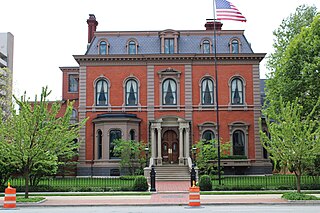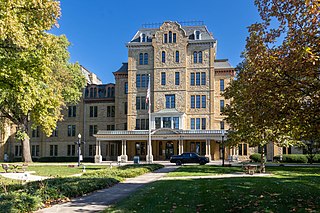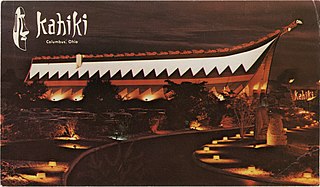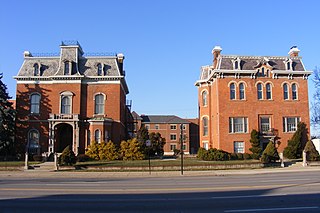
St. Francis DeSales High School is located in Columbus, Ohio, United States and is part of the Catholic Diocese of Columbus. The school has an enrollment of over 875 students, in four grade levels.

The Athletic Club of Columbus or ACC, is a private social club and athletic club in Downtown Columbus, Ohio. Located at 136 East Broad Street, it was founded in 1912.
This is a list of the National Register of Historic Places entries in Columbus, Ohio, United States. The National Register is a federal register for buildings, structures, and sites of historic significance. This is intended to be a complete list of the properties and districts in Columbus.

The Martin Luther King Jr. Performing and Cultural Arts Complex is a historic building in the King-Lincoln Bronzeville neighborhood of Columbus, Ohio. It was built in 1925 as the Pythian Temple and James Pythian Theater, and was added to the National Register of Historic Places and Columbus Register of Historic Properties in 1983. The building was renovated into the King Arts Complex in 1987, and was vacated in 2019. Community leaders restored the building's use as an arts center in 2021.

Saint Paul's Episcopal Church is a historic building in Columbus, Ohio.

The Knights of Columbus Building is a historic building located at Gary, Indiana. It was built in 1925, and is a ten-story brick building that has served as a hotel, a clubhouse, a restaurant, and a sport facility.

Knights of Columbus-South Bend Indiana Club is a historic Knights of Columbus building located at South Bend, St. Joseph County, Indiana, United States. It was built in 1924, and is a three-story, Renaissance Revival style brick and terra cotta building. The building features round arched windows with radiating voussoirs of brick and terra cotta.

The Knights of Columbus Building, also known as the Aero Club Building, in Portland, Oregon, was a Late Gothic Revival architecture building that was built in 1920. It was listed on the National Register of Historic Places from 1990 until its demolition. The building was demolished in 1998. The property is now the site of the Paramount Hotel.

The United States Post Office and Courthouse is a historic building in Downtown Columbus, Ohio. The structure was built from 1884 to 1887 as the city's main post office. The building also served as a courthouse of the United States District Court for the Southern District of Ohio from its completion in 1887 until 1934, when the court moved to the Joseph P. Kinneary United States Courthouse. The building was tripled in size from 1907 to 1912, and was rehabilitated for use as the Bricker & Eckler law offices in 1986, and today houses the same law firm.

Richards, McCarty & Bulford was an American architectural firm. The General Services Administration has called the firm the "preeminent" architectural firm of the city of Columbus, Ohio. A number of the firm's works are listed on the National Register of Historic Places.

The Ford Motor Company - Columbus Assembly Plant is a historic building in Downtown Columbus, Ohio. The Ford plant was constructed in 1914, to designs by John Graham. The plant operated until 1939. In later years, it became the Kroger Co. Columbus Bakery, operating until 2019. The building was sold in 2020, and is planned to be redeveloped into a large residential complex, announced in 2021. The building was added to the National Register of Historic Places and Columbus Register of Historic Properties in 2021.

The Benjamin Smith House is a historic building in Downtown Columbus, Ohio. It was listed on the National Register of Historic Places in 1973. The house was built c. 1860 for Benjamin E. Smith, a wealthy financier. Smith lived in the house until 1883, when he moved to New York City. Rented by Ohio as a governor's mansion, it housed Ohio governors George Hoadly and Joseph Foraker. In 1886, the Columbus Club, a private club in the city, purchased the house and grounds, and are still housed there today.

The Standard Building, also known as the Blue Cross Building or as the Gugle Building, is a historic building in Downtown Columbus, Ohio. The building was built in 1912. Early tenants included the Lancaster Tire & Rubber Company, the Mutual Life Insurance Company, Irwin Manufacturing Company, and the Grid Graph Company. It also served as the regional headquarters of Standard Oil of Ohio, from 1917 to 1955, occupying its sixth (top) floor. It was listed on the National Register of Historic Places and the Columbus Register of Historic Properties in 2019. Also in 2019, the building owner Connect Real Estate began redeveloping the building into apartments, with 45 units, including 35 micro studio apartments and 10 one-bedroom units. Connect Real Estate sought the building's historic listings for tax credits in refurbishing it. The realty company owns the adjacent Winders Motor Sales Company building, which it has separately listed on historic registers to make restoration more affordable.

Columbus Public Health is the health department of Columbus, Ohio. The department is accredited by the Public Health Accreditation Board. The department dates to 1833, when the city's mayor appointed five citizens to help with its cholera outbreak. It became a permanent body to activate whenever health emergencies arose.

The East Town Street Historic District is a historic district in Downtown Columbus, Ohio. The site was listed on the National Register of Historic Places in 1976 and the Columbus Register of Historic Properties in 1982; the district boundaries differ between the two entries.

The Greater Columbus Arts Council (GCAC) is an arts organization in Columbus, Ohio. The council funds artists and organizations in Central Ohio, and hosts the annual Columbus Arts Festival.

The Kahiki Supper Club was a Polynesian-themed restaurant in Columbus, Ohio. The supper club was one of the largest tiki-themed restaurants in the United States, and for a time, the only one in Ohio. It operated at its Eastmoor location on Broad Street beginning in 1961, at the height of tiki culture's popularity. The Kahiki was listed on the National Register of Historic Places in 1997, but closed and was demolished in 2000. It was described as an exceptionally important example of a themed restaurant and the most elaborate tiki restaurant ever built.

The East Broad Street Commercial Building is a historic building in Columbus, Ohio. It was built in 1930 and listed as part of the E. Broad St. Multiple Resources Area on the National Register of Historic Places in 1986. The building has served numerous businesses, including doctor's offices, insurance agencies, and a Kroger store (1930-1946). Chinese restaurants operated out of the building from 1930 to 1995: Golden Lotus from 1930 to 1950 and Jong Mea from 1950 to 1995.

The Ohio Farm Bureau Federation Offices are two historic buildings in Downtown Columbus, Ohio. The buildings were listed together on the National Register of Historic Places in 1987. They are located at the junction of Interstate 71 and Broad Street, a heavily trafficked area.





















